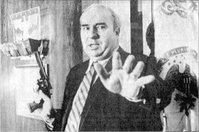January 22
 As the global coffee market plummeted in late 1931 and early 1932, the Great Depression indirectly generated one of the worst atrocities in Central American history. In January 1932, security forces from the right-wing government of El Salvador perpetrated la Matanza ("The Massacre") in which tens of thousands of indigenous peasants were systematically annihilated. In the aftermath of la Matanza, the language and culture of El Salvador's indigenous people was severely compromised.
As the global coffee market plummeted in late 1931 and early 1932, the Great Depression indirectly generated one of the worst atrocities in Central American history. In January 1932, security forces from the right-wing government of El Salvador perpetrated la Matanza ("The Massacre") in which tens of thousands of indigenous peasants were systematically annihilated. In the aftermath of la Matanza, the language and culture of El Salvador's indigenous people was severely compromised.In the decades prior to 1932, the Pipil -- the indigienous population of El Salvador-- had been uprooted from their traditional lands to make room for coffee plantations. As was customary throughout Latin America, a handful of privileged families owned nearly all of the nation's wealth. When a military junta led by the fascist admirer General Maximiliano Hernandez Martinez toppled the populist (and democratically elected) Arturo Araujo in December 1931, ordinary Salvadorans were enraged.
After weeks of strikes, fighting began on January 22 as Socorro Rojo, a communist social service organization based in the cities, joined with other ladino and indigenous groups in attacking a government garrison, cutting supply lines and taking over several towns in the rural, western regions of the country between Sonsonate and Santa Ana. Three days later, the government launched a counter-offensive that easily overwhelmed the insurgents, who were could array little more than machetes and knives against the formidable weaponry of the state. The uprising was crushed within the week, but the reprisals continued as the Salvadoran National Guard sought not merely to dismantle the revolt but to destroy as well the country's indigenous population. In some towns and villages, every male over the age of 12 was executed; others were shot merely for donning traditional indigenous dress or for speaking nahuat, the language of the Pipil. Estimates of the dead range from 10,000 to nearly 40,000, although the exact figures will probably never be determined.
Among the dead was the Socorro Rojo leader Augustin Farabundo Marti Rodriguez, who became one of the century's great martyrs for Central and South American leftists. Indeed, la Matanza continued to shape Salvadoran politics and culture for the rest of the century, exerting an especially debilitating effect on the Pipil. Today, fewer than 200 speakers of nahuat are left; 99 percent of El Salvador's Indian population remains impoverished.
General Martinez was himself ousted by a coup in 1944; two decades later, he was assassinated in Honduras. By his own standards, Martinez's death need not have been mourned. "It is a greater crime to kill an ant than a man," he once explained, "for when a man dies he becomes reincarnated, while an ant dies forever."
***
 Today also marks the 20th anniversary of the death of Robert Budd Dwyer, State Treasurer for Pennsylvania from 1980 until 22 January 1987, when Dwyer blew his head off during a press conference. At the time, Dwyer was facing a possible 55-year jail sentence for receiving a $300,000 kickback on a state contract; protesting his innocence, he had refused an earlier plea bagrain offer that would have sent him to the pokey for a comparatively short five-year sentence. After his conviction, the 47-year-old Dwyer grew understandably despondent over the possibility that he might someday die in prison. Calling a late morning press conference to "update" reporters on "the situation," Dwyer read a long, rambling statement that reiterated his innocence. He vowed, moreover, not to spend the remainder of his days in "an American gulag."
Today also marks the 20th anniversary of the death of Robert Budd Dwyer, State Treasurer for Pennsylvania from 1980 until 22 January 1987, when Dwyer blew his head off during a press conference. At the time, Dwyer was facing a possible 55-year jail sentence for receiving a $300,000 kickback on a state contract; protesting his innocence, he had refused an earlier plea bagrain offer that would have sent him to the pokey for a comparatively short five-year sentence. After his conviction, the 47-year-old Dwyer grew understandably despondent over the possibility that he might someday die in prison. Calling a late morning press conference to "update" reporters on "the situation," Dwyer read a long, rambling statement that reiterated his innocence. He vowed, moreover, not to spend the remainder of his days in "an American gulag." Dwyer thanked his supporters, expressed gratitude for his wife and children, then pulled a .357 magnum revolver from a manila envelope. Warning everyone to "stay away" because, "this thing might hurt someone," Budd Dwyer dutifully took his place in the macabre folklore of American politics. Television stations in Pittsburgh and Philadelphia aired complete footage of the suicide during their mid-day broadcasts. As a result, thousands of young children -- home from school thanks to a major snowstorm -- watched the State Treasurer trepanate himself with a single shot.
Over the past two decades, Budd Dwyer has become something of a fixture in the world of sub-popular music. Odes to Dwyer have been recorded by such bands as Mr. Yukk and Poison Control; Ion Dissonance; Tijiuana Car Wash; and Camp Kill Yourself. More well-known artists such as Marilyn Manson, Filter, Ministry and Faith No More have also given Budd Dwyer the everlasting life that was apparently denied to the Salvadoran General Maximiliano Hernandez Martinez.